英国国际酒店与旅游管理课程中英文对照
星级酒店培训纲要中英文对照

星级酒店培训纲要中英文对照星级酒店培训纲要中英文对照Star Hotel Training Outline1.员工礼仪1. Employee etiquette员工礼仪是星级酒店服务的重要组成部分,良好的礼仪能为顾客提供良好的服务。
员工礼仪包括形象、言语、动作等方面。
Employee etiquette is an important part of star hotel service. Good etiquette can provide good service for customers. Employee etiquette includes image, language, movement and other aspects.2.服务技能2. Service skills服务技能是星级酒店服务中必不可少的一部分,包括技巧、知识、细节等方面。
服务技能是提高顾客体验和提升酒店服务质量的重要手段。
Service skills are an indispensable part of star hotel service, including skills, knowledge, details and other aspects. Service skills are important means to improve customer experience and enhance hotel service quality.3.预定管理3. Reservation management预定管理是星级酒店运营中重要的一环,包括预订、预付款、预付订金、修改和取消预定等方面。
良好的预定管理可以提高酒店的营收和满意度。
Reservation management is an important part of star hotel operation, including booking,prepayment, pre-deposit, modification and cancellation of reservation and other aspects. Good reservation management can improve the hotel's revenue and satisfaction.4.前台接待4. Reception of front desk前台接待是星级酒店服务的第一道防线,包括前台接待和处理客人问题等方面。
CBU 酒店与旅游管理详细资料
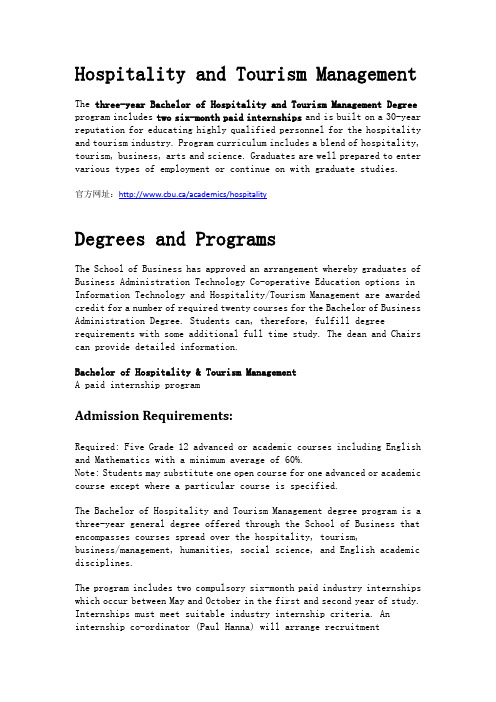
Hospitality and Tourism ManagementThe three-year Bachelor of Hospitality and Tourism Management Degree program includes two six-month paid internships and is built on a 30-year reputation for educating highly qualified personnel for the hospitality and tourism industry. Program curriculum includes a blend of hospitality, tourism, business, arts and science. Graduates are well prepared to enter various types of employment or continue on with graduate studies.官方网址:http://www.cbu.ca/academics/hospitalityDegrees and ProgramsThe School of Business has approved an arrangement whereby graduates of Business Administration Technology Co-operative Education options in Information Technology and Hospitality/Tourism Management are awarded credit for a number of required twenty courses for the Bachelor of Business Administration Degree. Students can, therefore, fulfill degree requirements with some additional full time study. The dean and Chairs can provide detailed information.Bachelor of Hospitality & Tourism ManagementA paid internship programAdmission Requirements:Required: Five Grade 12 advanced or academic courses including English and Mathematics with a minimum average of 60%.Note: Students may substitute one open course for one advanced or academic course except where a particular course is specified.The Bachelor of Hospitality and Tourism Management degree program is a three-year general degree offered through the School of Business that encompasses courses spread over the hospitality, tourism,business/management, humanities, social science, and English academic disciplines.The program includes two compulsory six-month paid industry internships which occur between May and October in the first and second year of study. Internships must meet suitable industry internship criteria. An internship co-ordinator (Paul Hanna) will arrange recruitmentpresentations and provide students with the opportunity to be interviewed on campus by national, provincial, and regional establishments for internship placement. Students are also encouraged to seek internship opportunities on their own, although all eligible internship placements are subject to approval by the Internship Co-ordinator.Academic terms 3 and 5 begin in mid-October allowing time for students to complete the 540 hours of approved industry employment required to fulfill the industry internship component of the program.Students should consult an academic advisor about appropriate electives.Program courses are spread across the hospitality/tourism(industry-specific), business (management) and non-business (liberal education) disciplines as follows:For detailed information, see the Academic Calendar (pdf) Curriculum:Year 1Fall Term (September-December) Winter Term (January-April)∙HATM 161 Introduction To Food Theory and Nutrition∙HATM 169 Guest Service Computer Applications∙100 level Humanities∙100 level English∙* 100 level Social Science ∙HATM 165 Hospitality/Tourism in Canada∙HATM 162 Restaurant Operation and Service∙100 level Humanities∙100 level English∙* 100 level Social Science* Science, Social Science or Natural ScienceSpring/Summer: Hospitality & Tourism Internship IYear 2Fall Term (October-December) Winter Term (January-April)∙HATM 268 Food Science Fundamentals for Hospitality Food Service Managers ∙HATM 361 Tourism Marketing∙HATM 367 Resort/FacilitiesManagement and Maintenance∙COMM 103 InterpersonalCommunication∙ECON 101 Principles of Microeconomics ∙HATM 269 Industry Internship I ∙HATM 365 Meetings and Convention Management∙BUSS 121 Financial Accounting∙COMM 105 Introduction to Public Communication∙MATH 151 Descriptive and BasicInferential Statistics∙ELECTIVE 200 level Humanities, English, or Social ScienceSpring/Summer: Hospitality & Tourism Internship IIYear 3Fall Term (October-December) Winter Term (January-April)∙HATM 370 Functions Management I∙HATM 368 Hospitality/Tourism Law∙BUSS 493 Tourism Management I∙ECON 102 Principles ofMacroeconomics∙BUSS 261 Introduction to Organizational Behaviour∙HATM 369 Advanced IndustryInternship II ∙BUSS 495 Tourism Strategy∙HATM 371 Functions Management II ∙BUSS 122 Financial Accounting II∙ELECTIVE 200 level or higherHumanities, English, or Social Science ∙ELECTIVE 200 level or higherHumanities, English, or Social Science2010 至2011 年度国际学生费用计算示例学费$11,320 – 11,470*保险费650住宿费3,530 – 5,400膳食费300 – 3,700合计$15,800 – 21,220国际学生本科费用ACADEMIC FEES 2011-2012Other Academic Fees。
萨里大学国际酒店与旅游管理
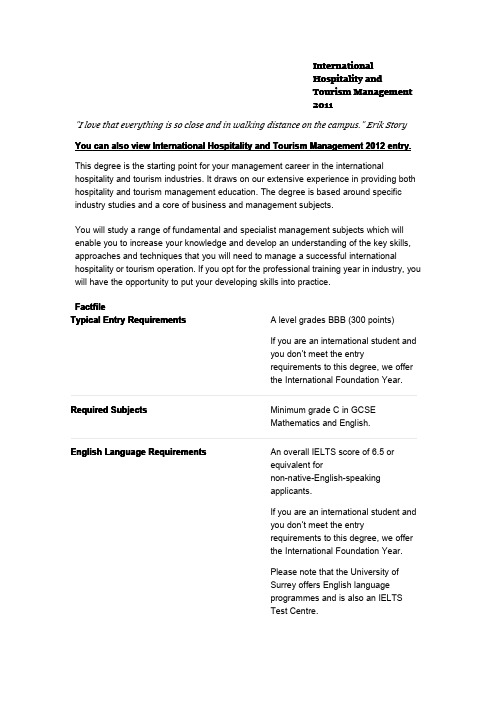
InternationalHospitality andTourism Management2011"I love that everything is so close and in walking distance on the campus."Erik Story You can also view International Hospitality and Tourism Management2012entry.This degree is the starting point for your management career in the international hospitality and tourism industries.It draws on our extensive experience in providing both hospitality and tourism management education.The degree is based around specific industry studies and a core of business and management subjects.You will study a range of fundamental and specialist management subjects which will enable you to increase your knowledge and develop an understanding of the key skills, approaches and techniques that you will need to manage a successful international hospitality or tourism operation.If you opt for the professional training year in industry,you will have the opportunity to put your developing skills into practice.Degree Programme BSc(Hons)DegreeProgrammeProgramme OverviewThe programme consists of compulsory and elective modules which you study to earn credits towards your final degree.You will study for120credits per level.At Level1all modules are compulsory and languages can be studied as optional elective modules.The compulsory modules will enable you to develop fundamental and international hospitality and tourism-specific management skills and knowledge.The hospitality-specific compulsory module,The Hospitality Business,provides you with a strong working knowledge of the international hospitality industry.You will be able to identify,analyse and evaluate the key issues that need to be addressed within the industry.The tourism-specific compulsory module,Business of Tourism,enables you to identify the principal components involved in the study and understanding of tourism,and it offers you a general introduction to the main tourism industry sectors:accommodation,transport,attractions and the travel trade.At Level2and Level3you will study a combination of compulsory modules based on fundamental management topics,and international hospitality and tourism-specific management topics.You will be able to choose from a wide selection of elective modules based on a variety of management topics including business,entrepreneurship,finance and retail,together with hospitality and tourism.Level3also provides the opportunity for you to undertake a final-year project consisting of detailed research in your particular field of interest.Programme StructureLevel1Compulsory modules:•Management Skills•Business Environment•Marketing Principles•Introductory Accounting•The Hospitality Business•Business of TourismPlus elective language modulesLevel2Compulsory modules:•Business Skills•Managing Organisations and Human Resources•Managing the Hospitality Business•Sustainable TourismPlus elective modulesLevel P•Optional professional training yearLevel3Compulsory modules:•Business Strategy•Final-year Project•International Tourism Destinations•Strategic Analysis of Hospitality CompaniesPlus elective modulesDetails of the elective modules are available online: /ugmodulematrix.更多资料:UCAS中国www.ucas.hk。
《旅游接待业(全英)》-课程教学大纲

《旅游接待业Introduction to Hospitality》课程教学大纲一、课程基本信息课程代码:20080092课程名称:旅游接待业(全英)英文名称:Introduction to Hospitality课程类别:专业课学时:32学分:2适用对象:旅游管理(中外人才培养实验班)考核方式:考试先修课程:无二、课程简介This course provides an understanding of Tourism, Hospitality and Events as separate fields of study and the interrelationship between them all. It looks at the role of THE in society, its involvement with industry and government and its impact on the environment. Tourism, hospitality and events are often viewed as almost separate industries/activities and university degree programs. However, this course is designed to study the inter-relationships that exist between these industries and to demonstrate how they fit into the wider industrial and social landscapes.Given the increasing trend towards globalization, both socially and economically, the course will take a global perspective of these industries/activities to exemplify how they are related to, and influence the nature of, one another.As a result of this course, students should recognize that although they may be focusing their studies on one particular industry/activity they need to take into account all the others in order to fully understand their chosen area of expertise.三、课程性质与教学目的This course aims for students to develop their knowledge and understanding of the industries/activities of tourism, hospitality and events. In particular students should have aclear understanding of the sectors of these industries/activities and the inter-relationships that exist between them.After successfully completing this course you should be able to:1.clearly define tourism, hospitality and event management;prehend and report on the inter-related nature of tourism, hospitality and events;3.understand and explain the concepts, evolution and impacts of tourism, hospitality andevents globally;4.work with peers to synthesise and communicate information on a particular topic fromthe body of knowledge on tourism, hospitality, and events;5.demonstrate academic literacy and ethical scholarship, and appreciate how this appliesto future studies;pare tourism and hospitality industries in China and globally, especially theroles of different actors and management/government principles in different countrie s.四、教学内容及要求Chapter 1 Introducing Hospitality1.Learning Objectives1.1Discuss the history of hospitality through the ages.1.2Describe the characteristics of the hospitality industry.1.3Explain corporate philosophy and total Quality Management.1.4Discuss the many facets of service and why it has become such an important part ofthe hospitality industry.1.5Suggest ways to improve service.1.6Discuss current trends in the hospitality industry.2.Contents2.1Hospitality through the ages.2.2The interrelated nature of hospitality and tourism.2.3Characteristics of the hospitality industry.2.4Sustainable hospitality.2.5Trends in hospitality and tourism.3.Review and Discussion3.1Compare and contrast the characteristics of the hospitality industry in relation to thetourism industry.3.2Identify the corporate philosophy of the global hospitality industry.3.3Assess the importance of Total Quality Management in the global hotel industry.3.4What is the difference between Total Quality Management and quality control?3.5Describe the history of the global hospitality industry.3.6Apart from sustainability and green travel, discuss two key trends in hospitality andtourism.4.Teaching MethodsLecture, Online resources application.Chapter 2 The Hotel Business1.Learning Objectives1.1Describe hotel ownership and development via hotel franchising and managementcontracts.1.2Explain the diamond rating classification of hotels.1.3Classify hotels by rating system type, location, and price.1.4Discuss the concept and growth of vacation ownership.1.5Discuss sustainable/green lodging.1.6Identify trends influencing the hotel business.2.Contents2.1Hotel development and ownership2.2Classification of hotels and lodging properties2.3International perspectives2.4Sustainable or green lodging2.5Trends in hotel development and management3.Review and Discussion3.1Why do you think an entrepreneur would choose to purchase a hotel instead ofacquiring a franchise?3.2Evaluate the importance of various hotel rating systems.3.3Critically assess the trends that you feel will have the biggest impact on the futureof the global hospitality industry.4.Teaching MethodsLecture, Online resources application.Chapter 3 Rooms Division1.Learning Objectives1.1Outline the duties and responsibilities of key executives and department heads.1.2Draw an organizational chart of the rooms division of a hotel and identify theexecutive committee members.1.3Describe the main functions of the rooms division departments.1.4Describe property management systems and discuss yield management.1.5Calculate occupancy percentages, average daily rates, and actual percentage ofpotential rooms revenue.1.6Outline the importance of the reservations and guest services functions.1.7List the complexities and challenges of the concierge, housekeeping, andsecurity/loss prevention departments.2.Contents2.1 The functions and departments of a hotel2.2Management structure and roles of departments2.3 Security/loss prevention2.4 Trends in hotel development and management3.Review and Discussion3.1Briefly define the purpose of a hotel. Why is it important to empathize with theculture of guests?3.2List the main responsibilities of the front- office manager.3.3What are the benefits of using a central reservation system?3.4Why is the concierge an essential part of the personality of a hotel?3.5Explain the importance of accident and loss prevention. What security measures aretaken to protect guests and their property?4.Teaching MethodsLecture, Online resources application.Chapter 4 Food and Beverage1.Learning Objectives1.1Describe the duties and responsibilities of a food and beverage director and otherkey department heads.1.2Describe a typical food and beverage director’s day.1.3State the functions and responsibilities of the food and beverage departments.1.4Perform computations using key food and beverage operating ratios.2.Contents2.1 Food and beverage management2.2 Kitchen2.3 Stewarding department2.4 Catering department2.5 Sustainable wine production2.6 Sustainable brewing2.7 Trends in the beverage industry3.Review and Discussion3.1Briefly describe the challenges a food and beverage director faces on a daily basis.3.2List the measures used to determine the food and beverage department’s profit andloss.3.3Explain the problems a hotel faces in making the following departments profitable:restaurants, bars, and room service.3.4Explain the importance of the catering department for a hotel and list theresponsibilities of a catering sales manager (CSM).4.Teaching MethodsLecture, Online resources application.Chapter 5 The Restaurant Business and Management1.Learning Objectives1.1Describe a restaurant’s front of the house.1.2Explain how restaurants forecast their business.1.3Describe restaurant service.1.4Describe front- and back-of-the-house systems.1.5Outline back-of-the-house operations.1.6Summarize restaurant management financials.2.Contents2.1 The restaurant business2.2 Franchises2.3 Sustainable restaurant operations2.4 Back-of-the-house operation2.5 Restaurant management financials2.6 Trends in the restaurant industry3.Review and Discussion3.1Most restaurants forecast a budget on a weekly and monthly basis, one that projectssales and costs for a year in consideration of guest counts and the average guest check.3.2To operate a restaurant, products need to be purchased, received, and properlystored.3.3Food production is determined by the expected business for the next few days. Thekitchen layout is designed according to the sales forecasted.3.4Good service is very important. In addition to taking orders, servers act assalespersons for the restaurant.3.5The front of the house deals with the part of the restaurant having direct contactwith guests, in other words, what the guests see—grounds maintenance, hosts/ hostesses, dining and bar areas, bartenders, bussers, and so on.3.6The back of the house is generally run by the food service/kitchen manager, andrefers to those functional areas and tasks with which guests usually do not come in contact. This includes purchasing, receiving, storing/issuing, food production, stewarding, budgeting, accounting, and control.4.Teaching MethodsLecture, Online resources application.Chapter 6 Tourism and managed services1.Learning Objectives1.1Summarize the historical impact of transportation on tourism.1.2Define tourism and describe the important international tourism organizations.1.3Describe the benefits and prospects of tourism.1.4Describe the economic impact of tourism.1.5Identify the promoters of tourism.1.6Summarize the sociocultural impact of tourism.1.7Describe ecotourism.2.Contents2.1 The historical impact of transportation on tourism2.2 What is tourism in the 21st century?2.3 The economic, social and cultural impact of tourism2.4 Ecotourism2.5 Sustainable tourism2.6Cultural, heritage, nature, and volunteer tourism2.7Trends in tourism and travel3.Review and Discussion3.1Give a broad definition of tourism and explain why people are motivated to travel.3.2explain the objectives of the UNWTO. What are the characteristics of the travel andtourism industry according to the UNWTO and the WTTC?3.3Choose a career in the tourism business and give a brief overview of what yourresponsibilities would be.3.4Discuss the positive and negative impacts that tourism can have on a country inrelation to tourism pollution and ecotourism.4.Teaching MethodsLecture, Online resources application.Chapter 7 Recreation, Attractions, and Clubs1.Learning Objectives1.1Discuss the relationship of recreation and leisure to wellness.1.2Explain the origins and extent of government-sponsored recreation.1.3Distinguish between commercial and noncommercial recreation.1.4Identify different types of major attractions in China and globally.2.Contents2.1 Recreation, leisure and wellness2.2 Government-sponsored recreation3.2Commercial recreation attractions3.3Managing attractions3.4Noncommercial recreation2.6 Trends in recreation and leisure3.Review and Discussion3.1Define recreation and its importance to human wellness. What factors affect anindividual’s decision to participate in recreational activities?3.2Describe three recreation activities that are sponsored by the Chinesegovernment and identify the superiority of the socialist system.3.3Briefly describe the difference between commercial and noncommercial recreation.4.Teaching MethodsLecture, Online resources applicationChapter 8 Gaming Entertainment1.Learning Objectives1.1Outline the history of modern casinos.1.2Describe the various components of modern casino hotels.1.3Explain how casinos have been integrated into larger hospitality operations.1.4Understand the basic principles of casino operations.1.5Discuss the different positions within the gaming industry.2.Contents2.1 Historical review of gaming entertainment2.2Case of Macau2.3Working in a casino resort2.4Sustainability in gaming entertainment2.5Trends in the gaming entertainment industry3.Review and Discussion3.1What defines a gaming entertainment business?3.2Explain the attraction of gaming entertainment as a tourist.3.3Why is it necessary for strict regulations to be in force on the casino floor?3.4How are hotel operations in a gaming entertainment business different from hoteloperations in a nongaming environment?4.Teaching MethodsLecture, Online resources applicationChapter 9 Meetings, Conventions and Expositions1.Learning Objectives1.1List the major players in the convention industry.1.2Describe destination management companies.1.3Describe the different aspects of being a meeting planner.1.4Explain the different types of meetings, conventions, and expositions.1.5List the various venues for meetings, conventions, and expositions.2.Contents2.1 Development of the meetings, conventions, and expositions industry2.2 Key players in the industry2.3 Types of meetings, conventions, and expositions2.4 Historical associations2.5 venues for meetings, conventions, and expositions1.6Sustainable meetings, conventions, and expositions2.6 Trends in meetings, conventions, and expositions3.Review and Discussion3.1Which new technologies are being used in meetings and conventions?3.2Why are cruise ships being increasingly used as venues for meetings?3.3Discuss the role and functions of a DMC.3.4Outline the format of a typical convention program.4.Teaching MethodsLecture, Online resources applicationChapter 10 Special Events1.Learning Objectives1.1Define a special event.1.2Describe what event planners do.1.3Classify special events.1.4Outline the skills and abilities required for event management.1.5Identify the main professional organizations and associations involved with thespecial events industry.2.Contents2.1 Classifications of special events2.2What event planners do2.3Required skills and abilities for event management2.4Special event organizations2.5Sustainability in special events2.6 Trends in the special events industry3.Review and Discussion3.1What are the responsibilities of an event planner?3.2What are the challenges for event planners and managers?3.3Describe three of the classifications of special events.3.4Describe what organizers should do for crisis management.4.Teaching MethodsLecture, Online resources applicationChapter 11 Leadership and Management1.Learning Objectives1.1Identify the characteristics and practices of leaders.1.2Define leadership.1.3Identify the characteristics and practices of management.1.4Define management.1.5Differentiate between leadership and management.1.6Discuss ethics in hospitality.2.Contents2.1 Leadership in hospitality management2.2Sustainable leadership2.3 Ethical dilemmas in hospitality2.4 Trends in leadership and management3.Review and Discussion3.1Give examples of the management functions as they apply to the hospitalityindustry.3.2Discuss the changing role of managers.3.3Define leadership and name the essential qualities of a good leader.4.Teaching MethodsLecture, Online resources application六、课程考核(一)考核方式考试(二)成绩构成平时成绩占比:40% 期末考试占比:60%(三)成绩考核标准1. Assessment:Presentation: Content (40%) + Structure (30%) + Oral Presentation (15%) + Aesthetics (15%)Reading Report: Content (40%) +Structure (30%) + Grammar (20%) + Aesthetics (10%)2. Class Attendance3. Finals七、推荐教材和教学参考资源1.Walker, J. R. (2017). Introduction to Hospitality (7th ed.). Prentice Hall.2.Ford, R.C., Sturman, M.C. & Heaton, C.P. (2012). Managing Quality Service inHospitality: How Organizations Achieve Excellence in the Guest Experience. Pages 14-17.3.Weaver, D. & Lawton, L. (2014). Tourism Management, 5th Ed. Pages 50-60.4.Walker, J.R. (2013). Introduction to Hospitality, 6th Ed. Pages 354-356.5.UNWTO. (2019). Tourism Highlights. https:///10.18111/97892844211526.Weaver, D. & Lawton, L. (2014). Tourism Management, 5th Ed. Pages 286-295.7.Ford, R.C., Sturman, M.C. & Heaton, C.P. (2012). Managing Quality Service inHospitality: How Organizations Achieve Excellence in the Guest Experience.lard, N. (2006). Learning from the ‘wow’ factor- how to engage customers throughthe design of effective affective customer experiences. BT Technology, 24(1), 11-16.9.Calahan, M. (2014). What do the words hospitality and customer service mean to you?10.Coussement, M.A., Tanyatanaboon, M., Li, Z., Shportko, A. & Miao, L. (2014). Astrategy of duality: New choreography for the Marriott/Ritz-Carlton dance. Journal of Hospitality & Tourism Cases.。
西英格兰大学国际旅游管理硕士
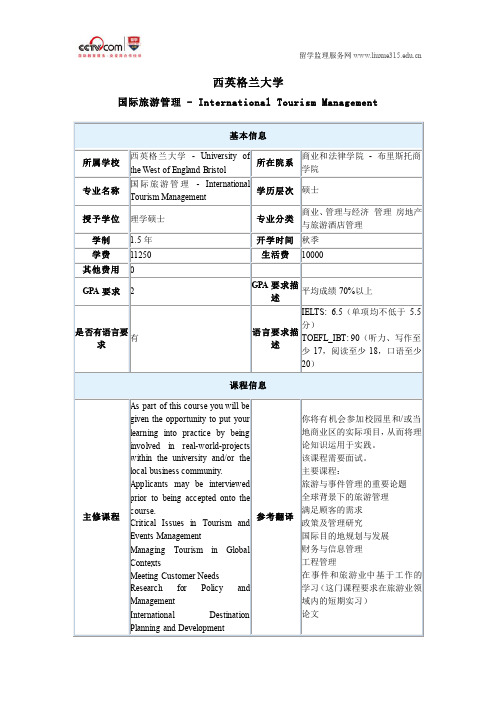
西英格兰大学国际旅游管理 - International Tourism Management西英格兰大学University of the West of England Bristol综合排名:62学校类型:公立- 综合性大学所在地:英国英格兰布里斯托录取率:暂无统计每年学费:8万(人民币)是否有奖学金:是在校生人数:30069开学时间:秋季学校网址:院校介绍院校简介西英格兰大学是英国最受欢迎的大学之一,有约30000名在校学生和3500位教职员工,其中有2636名来自140多个国家的国际留学生,是英格兰西南地区最大的高等教育机构。
虽然它是一所现代学校,但其渊源可追溯至1595年创办的一所航海学校。
400多年来,在英国大专院校重组过程中,不断融合了英国的多所学院,一直到1992年在高等教育法令下,成为西英格兰大学。
西英格兰大学位于历史悠久、景色优美的海滨城市布里斯托,该校优异的教学和研究也为这座城市的社会和经济发展做出了重要的贡献。
学校特有的毕业生发展项目重视与产业和公司的联接,为学生提供体验实际工作并培养职业技能的机会,增强了其毕业生在就业市场中的竞争力。
院系介绍西英格兰大学分为四个学院,分别是艺术、创意产业和教育学院,商业和法律学院,环境和技术学院以及健康和生命科学学院。
各大学院又可分为共17个系,设有600多个本科和研究生专业及32个研究中心。
课程涉及许多学科领域,如应用科学,艺术、传媒和设计,商科,环境营造,计算,工程和数学科学,教育,健康和社会保障,人文,语言和社会科学,法律。
教学水平优秀的学科包括艺术与设计、商业研究、交流与媒体研究、经济学、教育、英语、地产与物业管理、法律、生物学、护理、药剂学与药理学、心理学、社会学与社会政策、城镇规划。
学术实力在2012年TIMES英国大学排名中,西英格兰大学排在第67位。
2001年科研水平评估结果显示,西英格兰大学的会计与金融专业的科研水平被评为最高级别;2008年的RAE显示该校约三分之一的研究成果是“世界领先”或“国际优秀”。
著名国际五星级酒店培训教材大全中英对照
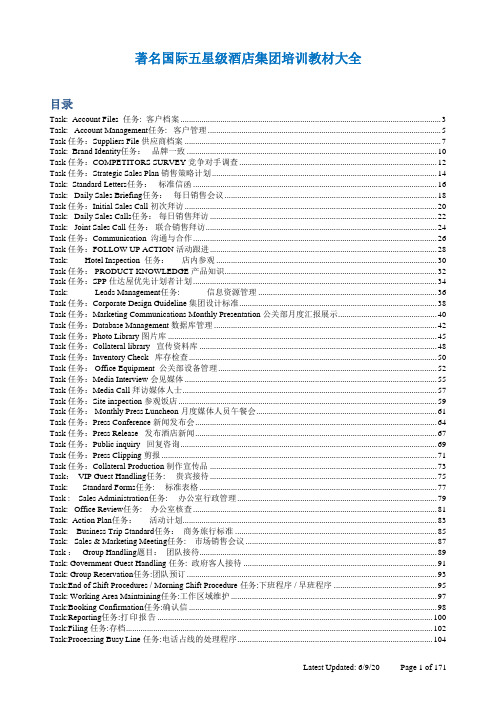
著名国际五星级酒店集团培训教材大全目录Task: Account Files 任务: 客户档案 (3)Task: Account Management任务: 客户管理 (5)Task 任务:Suppliers File 供应商档案 (7)Task: Brand Identity任务:品牌一致 (10)Task 任务:COMPETITORS SURVEY 竞争对手调查 (12)Task 任务:Strategic Sales Plan 销售策略计划 (14)Task: Standard Letters任务:标准信函 (16)Task: Daily Sales Briefing任务:每日销售会议 (18)Task 任务:Initial Sales Call 初次拜访 (20)Task: Daily Sales Calls任务:每日销售拜访 (22)Task: Joint Sales Call 任务:联合销售拜访 (24)Task 任务:Communication 沟通与合作 (26)Task 任务:FOLLOW UP ACTION 活动跟进 (28)Task: Hotel Inspection 任务:店内参观 (30)Task 任务: PRODUCT KNOWLEDGE 产品知识 (32)Task 任务:SPP 仕达屋优先计划者计划 (34)Task: Leads Management任务: 信息资源管理 (36)Task 任务:Corporate Design Guideline 集团设计标准 (38)Task 任务:Marketing Communications Monthly Presentation 公关部月度汇报展示 (40)Task 任务:Database Management 数据库管理 (42)Task 任务:Photo Library 图片库 (45)Task 任务:Collateral library 宣传资料库 (48)Task 任务:Inventory Check 库存检查 (50)Task 任务: Office Equipment 公关部设备管理 (52)Task 任务:Media Interview 会见媒体 (55)Task 任务:Media Call 拜访媒体人士 (57)Task 任务:Site inspection 参观饭店 (59)Task 任务: Monthly Press Luncheon 月度媒体人员午餐会 (61)Task 任务:Press Conference 新闻发布会 (64)Task 任务:Press Release 发布酒店新闻 (67)Task 任务:Public inquiry 回复咨询 (69)Task 任务:Press Clipping 剪报 (71)Task 任务:Collateral Production 制作宣传品 (73)Task: VIP Guest Handling任务: 贵宾接待 (75)Task: Standard Forms任务: 标准表格 (77)Task : Sales Administration任务: 办公室行政管理 (79)Task: Office Review任务: 办公室核查 (81)Task: Action Plan任务:活动计划 (83)Task: Business Trip Standard任务:商务旅行标准 (85)Task: Sales & Marketing Meeting任务: 市场销售会议 (87)Task : Group Handling题目:团队接待 (89)Task: Government Guest Handling 任务: 政府客人接待 (91)Task: Group Reservation任务:团队预订 (93)Task:End of Shift Procedures / Morning Shift Procedure 任务:下班程序 / 早班程序 (95)Task: Working Area Maintaining任务:工作区域维护 (97)Task:Booking Confirmation任务:确认信 (98)Task:Reporting任务:打印报告 (100)Task:Filing 任务:存档 (102)Task:Processing Busy Line 任务:电话占线的处理程序 (104)Task:Taking Message任务:电话留言 (106)Task:Guest Name任务:客人名字 (108)Task:Guest History Profiles任务:客人档案管理 (110)Task:Answering the telephone-guest greetings/ SPG recognition任务:接听电话/仕达屋优先顾客计划会员识别标准 (112)Task:Checking Availability 任务:查看可卖房 (114)Task:Taking Reservation / Same day Reservations任务:作预订/ 当天预订 (116)Task:Guaranteed Arrival 任务:担保预定 (118)Task:No Show任务:预订未到 (120)Task:Amendments and Cancellations任务:更改和取消预订 (122)Task:VIP Booking 任务:贵宾预订 (124)Task:Airport Transfer & Limousine Booking任务:接送机和租用车服务 (126)Task:Special Requests & Trace Function任务:特殊要求及跟踪服务 (128)Task:Next Arrival Report Checking任务:检查第二天预抵客人报表 (130)Task:Choice Program任务:选择计划 (132)Task:Room Blocking任务:锁房 (134)Task:Overbooking任务:超额预订 (136)Task:Waiting List & Recommend other hotel任务:等候名单和推荐其他酒店 (138)Task:CI & M Inquiry任务:会议及宴会预订需要 (140)Task:Restaurant Booking任务:餐厅预订 (142)Task:Handling Complaints 任务:处理客人投诉 (144)Task:Build Rapport with key booker任务:与订房人建立良好关系 (146)Task:Check-In / Check – Out Times, Early Arrival and Late Departure.任务:登记和结帐时间, 提前抵店和推迟离开。
英国旅游酒店管理专业留学介绍
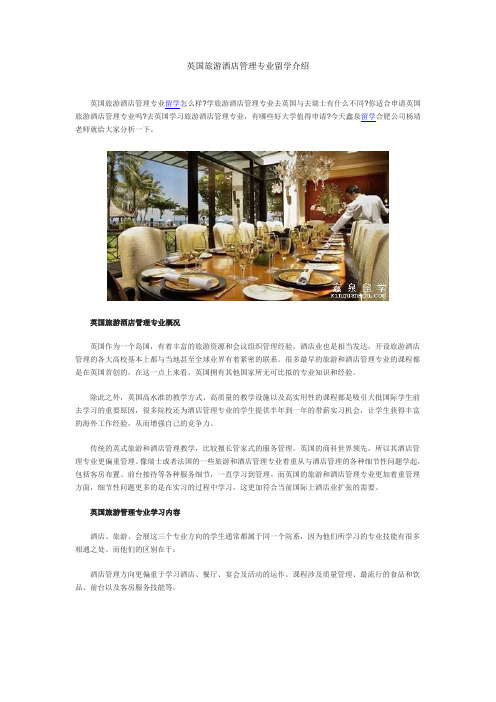
英国旅游酒店管理专业留学介绍英国旅游酒店管理专业留学怎么样?学旅游酒店管理专业去英国与去瑞士有什么不同?你适合申请英国旅游酒店管理专业吗?去英国学习旅游酒店管理专业,有哪些好大学值得申请?今天鑫泉留学合肥公司杨靖老师就给大家分析一下。
英国旅游酒店管理专业概况英国作为一个岛国,有着丰富的旅游资源和会议组织管理经验,酒店业也是相当发达,开设旅游酒店管理的各大高校基本上都与当地甚至全球业界有着紧密的联系。
很多最早的旅游和酒店管理专业的课程都是在英国首创的,在这一点上来看,英国拥有其他国家所无可比拟的专业知识和经验。
除此之外,英国高水准的教学方式、高质量的教学设施以及高实用性的课程都是吸引大批国际学生前去学习的重要原因,很多院校还为酒店管理专业的学生提供半年到一年的带薪实习机会,让学生获得丰富的海外工作经验,从而增强自己的竞争力。
传统的英式旅游和酒店管理教学,比较擅长管家式的服务管理。
英国的商科世界领先,所以其酒店管理专业更偏重管理。
像瑞士或者法国的一些旅游和酒店管理专业着重从与酒店管理的各种细节性问题学起,包括客房布置、前台接待等各种服务细节,一直学习到管理。
而英国的旅游和酒店管理专业更加着重管理方面,细节性问题更多的是在实习的过程中学习,这更加符合当前国际上酒店业扩张的需要。
英国旅游管理专业学习内容酒店、旅游、会展这三个专业方向的学生通常都属于同一个院系,因为他们所学习的专业技能有很多相通之处。
而他们的区别在于:酒店管理方向更偏重于学习酒店、餐厅、宴会及活动的运作。
课程涉及质量管理、最流行的食品和饮品、前台以及客房服务技能等。
会展管理方向的课程内容相对更加全面,包括:如何策划、宣传和执行一项活动;这里所说的活动形式会更加多样化,从小型婚礼到大型会议,或者诸如American super bowl(美国超级碗)之类的大型赛事都是要学习的内容。
旅游管理方向的学生将学习如何规划和统筹管理人们的出行,并思考人们的出行对经济、环境和社会所产生的影响。
旅游英语电子课件Unit 5Accommodation
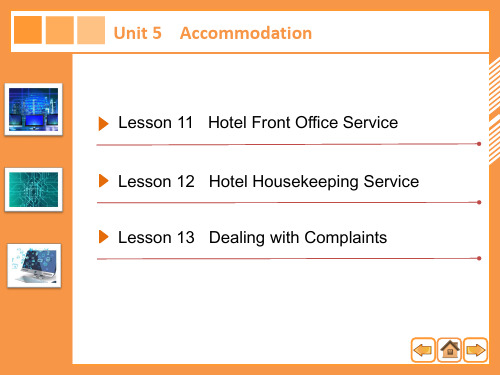
driver concierge clerk
front office manager bellman
reservation clerk reception clerk
front office manager
reservation clerk reception clerk
concierge clerk
Look and Learn Dialogue Reading Learn More New Words and Phrases
Unit 5
Lesson 5411
李峰是酒店的前厅接待员,他正在为导游Peter Black所带的 旅游团办理酒店入住手续。 Li Feng: All right, let me have a check. Yes, all are non-smoking rooms. Arrival date is December 1st, 2015 and departure date December 4th, 2015. Can I see your passports, please?
Look and Learn Dialogue Reading Learn More New Words and Phrases
Unit 5
Lesson 5411
李峰是酒店的前厅接待员,他正在为导游Peter Black所带的 旅游团办理酒店入住手续。 Li Feng: Of course. Your rooms are on the 15th floor. The bellman will take you to your rooms.
Look and Learn Dialogue Reading Learn More New Words and Phrases
英国国际酒店与旅游管理课程中英文对照

英国国际酒店与旅游管理课程中英文对照课程英文名课程翻译中文名Marketing 市场营销Hospitality Concept and Innovations 酒店概念与创新Dissertation 硕士毕业论文Tourism Destination Management and Marketing 旅游目的地管理与市场营销Major Event Policy and Practice 重要会展政策与应用Research Methods 研究方法Leadership and Entrepreneurship 领导能力与企业家能力Research and Consultancy Project 顾问设计与研究Managing People 人员管理Sector Industry Analysis 产业分析以上课程有些都为提及旅游,但课程范围都在旅游范围内,例如:市场营销是专门针对旅游产业的市场营销,研究方法具体涉及旅游产业的研究方法等等。
荷兰旅游管理课程中英文对照课程英文名Concept Development Tourism & Leisure Industry A1 旅游与休闲管理产业概展A1 Concept Development Tourism & Leisure Industry A2 旅游与休闲管理产业概展A2 Concept Development Tourism & Leisure Industry A3 旅游与休闲管理产业概展A3 Introduction (IP)A 课程介绍Strategic Management (IP) C 战略管理Strategic Management (IP) PR 战略管理Strategic Management (IP) Wr 战略管理Thesis (IP) M 毕业论文M Thesis (IP) W1 毕业论文W1 Thesis (IP) W2 毕业论文W2 Workshop 1 (IP) C 课程研讨Workshop 1 (IP) W 课程研讨Workshop 1 (IP) W 课程研讨我保证,以上课程均经过教育部的国外学历学位认证,真实准确。
著名国际五星级酒店培训教材大全(中英对照)
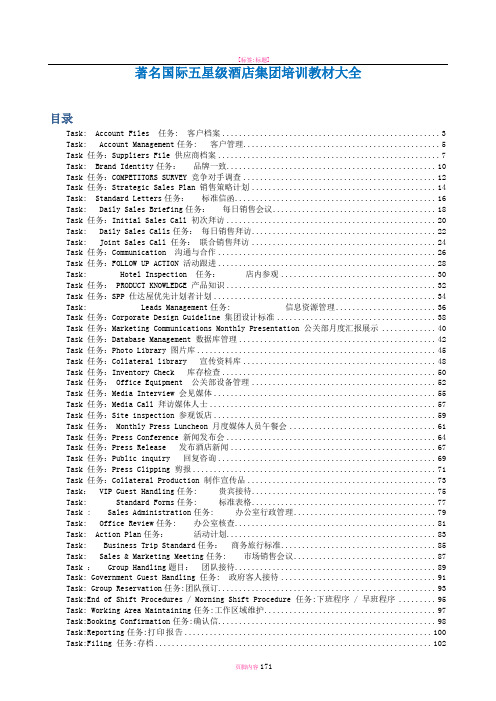
著名国际五星级酒店集团培训教材大全目录Task: Account Files 任务: 客户档案 (3)Task: Account Management任务: 客户管理 (5)Task 任务:Suppliers File 供应商档案 (7)Task: Brand Identity任务:品牌一致 (10)Task 任务:COMPETITORS SURVEY 竞争对手调查 (12)Task 任务:Strategic Sales Plan 销售策略计划 (14)Task: Standard Letters任务:标准信函 (16)Task: Daily Sales Briefing任务:每日销售会议 (18)Task 任务:Initial Sales Call 初次拜访 (20)Task: Daily Sales Calls任务:每日销售拜访 (22)Task: Joint Sales Call 任务:联合销售拜访 (24)Task 任务:Communication 沟通与合作 (26)Task 任务:FOLLOW UP ACTION 活动跟进 (28)Task: Hotel Inspection 任务:店内参观 (30)Task 任务: PRODUCT KNOWLEDGE 产品知识 (32)Task 任务:SPP 仕达屋优先计划者计划 (34)Task: Leads Management任务: 信息资源管理 (36)Task 任务:Corporate Design Guideline 集团设计标准 (38)Task 任务:Marketing Communications Monthly Presentation 公关部月度汇报展示 (40)Task 任务:Database Management 数据库管理 (42)Task 任务:Photo Library 图片库 (45)Task 任务:Collateral library 宣传资料库 (48)Task 任务:Inventory Check 库存检查 (50)Task 任务: Office Equipment 公关部设备管理 (52)Task 任务:Media Interview 会见媒体 (55)Task 任务:Media Call 拜访媒体人士 (57)Task 任务:Site inspection 参观饭店 (59)Task 任务: Monthly Press Luncheon 月度媒体人员午餐会 (61)Task 任务:Press Conference 新闻发布会 (64)Task 任务:Press Release 发布酒店新闻 (67)Task 任务:Public inquiry 回复咨询 (69)Task 任务:Press Clipping 剪报 (71)Task 任务:Collateral Production 制作宣传品 (73)Task: VIP Guest Handling任务: 贵宾接待 (75)Task: Standard Forms任务: 标准表格 (77)Task : Sales Administration任务: 办公室行政管理 (79)Task: Office Review任务: 办公室核查 (81)Task: Action Plan任务:活动计划 (83)Task: Business Trip Standard任务:商务旅行标准 (85)Task: Sales & Marketing Meeting任务: 市场销售会议 (87)Task : Group Handling题目:团队接待 (89)Task: Government Guest Handling 任务: 政府客人接待 (91)Task: Group Reservation任务:团队预订 (93)Task:End of Shift Procedures / Morning Shift Procedure 任务:下班程序 / 早班程序 (95)Task: Working Area Maintaining任务:工作区域维护 (97)Task:Booking Confirmation任务:确认信 (98)Task:Reporting任务:打印报告 (100)Task:Filing 任务:存档 (102)Task:Processing Busy Line 任务:电话占线的处理程序 (104)Task:Taking Message任务:电话留言 (106)Task:Guest Name任务:客人名字 (108)Task:Guest History Profiles任务:客人档案管理 (110)Task:Answering the telephone-guest greetings/ SPG recognition任务:接听电话/仕达屋优先顾客计划会员识别标准 (112)Task:Checking Availability 任务:查看可卖房 (114)Task:Taking Reservation / Same day Reservations任务:作预订/ 当天预订 (116)Task:Guaranteed Arrival 任务:担保预定 (118)Task:No Show任务:预订未到 (120)Task:Amendments and Cancellations任务:更改和取消预订 (122)Task:VIP Booking 任务:贵宾预订 (124)Task:Airport Transfer & Limousine Booking任务:接送机和租用车服务 (126)Task:Special Requests & Trace Function任务:特殊要求及跟踪服务 (128)Task:Next Arrival Report Checking任务:检查第二天预抵客人报表 (130)Task:Choice Program任务:选择计划 (132)Task:Room Blocking任务:锁房 (134)Task:Overbooking任务:超额预订 (136)Task:Waiting List & Recommend other hotel任务:等候名单和推荐其他酒店 (138)Task:CI & M Inquiry任务:会议及宴会预订需要 (140)Task:Restaurant Booking任务:餐厅预订 (142)Task:Handling Complaints 任务:处理客人投诉 (144)Task:Build Rapport with key booker任务:与订房人建立良好关系 (146)Task:Check-In / Check – Out Times, Early Arrival and Late Departure.任务:登记和结帐时间, 提前抵店和推迟离开。
去英国留学读什么专业好就业
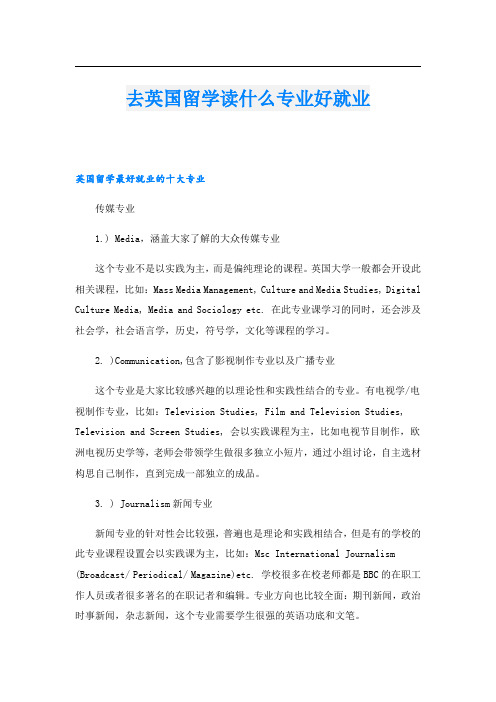
去英国留学读什么专业好就业英国留学最好就业的十大专业传媒专业1.) Media,涵盖大家了解的大众传媒专业这个专业不是以实践为主,而是偏纯理论的课程。
英国大学一般都会开设此相关课程,比如:Mass Media Management, Culture and Media Studies, Digital Culture Media, Media and Sociology etc. 在此专业课学习的同时,还会涉及社会学,社会语言学,历史,符号学,文化等课程的学习。
2. )Communication,包含了影视制作专业以及广播专业这个专业是大家比较感兴趣的以理论性和实践性结合的专业。
有电视学/电视制作专业,比如:Television Studies, Film and Television Studies, Television and Screen Studies, 会以实践课程为主,比如电视节目制作,欧洲电视历史学等,老师会带领学生做很多独立小短片,通过小组讨论,自主选材构思自己制作,直到完成一部独立的成品。
3. ) Journalism新闻专业新闻专业的针对性会比较强,普遍也是理论和实践相结合,但是有的学校的此专业课程设置会以实践课为主,比如:Msc International Journalism (Broadcast/ Periodical/ Magazine)etc. 学校很多在校老师都是BBC的在职工作人员或者很多著名的在职记者和编辑。
专业方向也比较全面:期刊新闻,政治时事新闻,杂志新闻,这个专业需要学生很强的英语功底和文笔。
推荐学校1、莱斯特大学 University of Leicester2013Times全英传媒专业排名第13,Media and Communication学院是英国成立最早的传媒学院。
Globalization and Communications MA 全球化与沟通Mass Communications MA 大众传媒Media and Advertising MA 传媒与广告Media and Communication Research MSc 传媒与传播研究Media and Public Relations MA 传媒与公共关系New Media and Society MA 新媒体与社会2、华威大学 University of Warwick华威大学在传媒领域一直排名前五。
牛津布鲁克斯大学国际酒店与旅游营销硕士专业
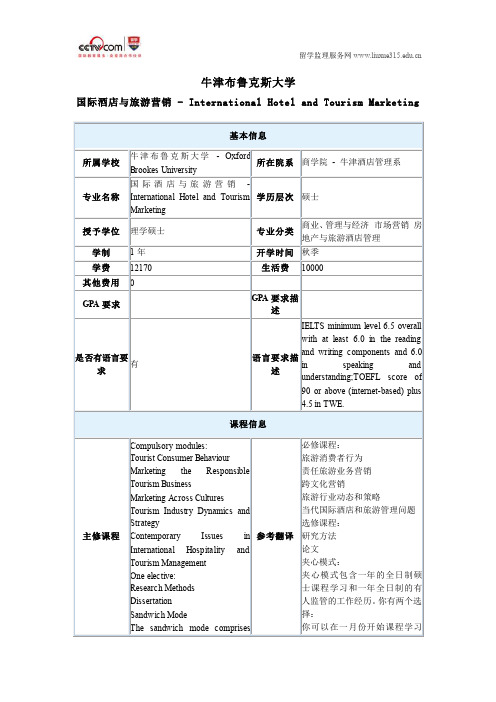
课程信息
主修课程
Compulsory modules:
Tourist Consumer Behaviour
Marketing the Responsible
Tourism Business
Marketing Across Cultures
Tourism Industry Dynamics and
Strategy Contemporary
室内建筑学
3
Interior Architecture
荣誉文学学士
每
技术,设计与 £11000
年
环境学院
约合11万
秋
建筑系
(人民币)
季
计算机辅助机械工程
Computer Mechanical Engineering
Aided
3
数学科学
3
Mathematical Sciences
荣誉理学学士 荣誉理学学士
留学监理服务网
牛津布鲁克斯大学 Oxford Brookes University
综合排名:53 学校类型:公立 - 综合性大学 所在地:英国 英格兰 牛津 录取率:13.00% 每年学费:12万(人民币) 是否有奖学金:是 在校生人数:18695 开学时间:秋季 学校网址:
留学监理服务网
牛津布鲁克斯大学
国际酒店与旅游营销 - International Hotel and Tourism Marketing
基本信息
所属学校
专业名称
授予学位 学制 学费
其他费用 GPA 要求
牛 津 布 鲁 克 斯 大 学 - Oxford 所在院系 Brookes University
每 技术,设计与 £11750
旅游管理外文及翻译
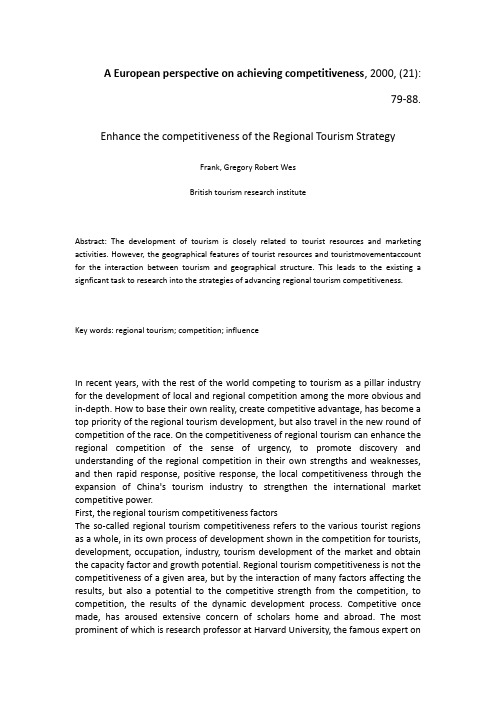
A European perspective on achieving competitiveness, 2000, (21):79-88.Enhance the competitiveness of the Regional Tourism StrategyFrank, Gregory Robert WesBritish tourism research instituteAbstract: The development of tourism is closely related to tourist resources and marketing activities. However, the geographical features of tourist resources and touristmovementaccount for the interaction between tourism and geographical structure. This leads to the existing a signficant task to research into the strategies of advancing regional tourism competitiveness.Key words: regional tourism; competition; influenceIn recent years, with the rest of the world competing to tourism as a pillar industry for the development of local and regional competition among the more obvious and in-depth. How to base their own reality, create competitive advantage, has become a top priority of the regional tourism development, but also travel in the new round of competition of the race. On the competitiveness of regional tourism can enhance the regional competition of the sense of urgency, to promote discovery and understanding of the regional competition in their own strengths and weaknesses, and then rapid response, positive response, the local competitiveness through the expansion of China's tourism industry to strengthen the international market competitive power.First, the regional tourism competitiveness factorsThe so-called regional tourism competitiveness refers to the various tourist regions as a whole, in its own process of development shown in the competition for tourists, development, occupation, industry, tourism development of the market and obtain the capacity factor and growth potential. Regional tourism competitiveness is not the competitiveness of a given area, but by the interaction of many factors affecting the results, but also a potential to the competitive strength from the competition, to competition, the results of the dynamic development process. Competitive once made, has aroused extensive concern of scholars home and abroad. The most prominent of which is research professor at Harvard University, the famous expert oncompetitive strategy Porter, his "national diamond map" model for industry competitiveness study provides an economic paradigm. In this paradigm which, Porter summarized the six factors: (1) factors of production, including natural resources, human resources, knowledge resources, capital resources and infrastructure; (2) demand conditions, the major source markets that the demand structure and the scale of demand; (3) related and supporting industries conditions;(4) business strategy, structure and competition; (5) government action; (6) opportunities. For the tourism industry, because of its comprehensive features of its development, determine the impact of competitive factors in the regional tourism industry is also multifaceted. Based on these factors affect the competitiveness of the tourism industry, the size, can be divided into a decisive factor in supporting factors, developmental factors and security factors. Decisive factors include the conditions of resources, tourism demand conditions, the competitiveness of tourism enterprises and the regional state tourism image overseas. These factors constitute the core of competitiveness of regional tourism, but also to improve the future competitiveness of the regional tourism industry must focus. Factors supporting the development of tourism is not simply to exist, but the increase through its own perfect and can better stimulate and promote the competitiveness of regional tourism enhancement. Such factors include infrastructure, related and supporting industry conditions, personnel quality, technology level. Regional tourism development factor is the formation and savings based on the future competitiveness, mainly referring to the regional tourism resources development and utilization of capacity, marketing, tourism enterprises, innovation, tourism, access to capital and the use of capacity, tourism industry, optimization, adjustment capability . Protective factors constitute the development of regional tourism industry, the external environment, to promote and ensure the smooth direction of tourism development along healthy. Such factors include the tourism environment, the government and other development opportunities. Affect the competitiveness of the regional tourism industry is not independent of each other four factors, but an organic community. Decisive factor in competitiveness as a regional tourism in the core part of their development directly affects the strength of the overall competitiveness of the region. When the supporting factors for more approach and tilt to the tourism industry, the development of factors can play a better role. The supporting factors and developmental factors working together, can enhance the decisive factors on the actual and potential tourist attraction, but also to better meet the needs of visitors and enhance visitor satisfaction provide a guarantee. Factors can protect the decisive factor, supporting factors and developmental factors play better to create a good atmosphere, contributed to the severity.Second, to enhance the competitiveness of regional tourism strategy choice Competitive loading phase theory of Porter on the industry, another important contribution to competitiveness, according to this theory, the formation of regional tourism competitiveness go through four stages, namely, factor-driven stage, the investment-driven stage, innovation-driven stage and wealth driver stage. It is characterized by two stages: In the factor-driven stage, the formation ofcompetitiveness from the rich resources of the region require regional integration through the resources found superior resources, then the resource advantage into competitive advantage. Investment-driven stage of the formation of the competitiveness of the region benefited from government and business and investment willingness and ability to the development of advanced production factors. For most of our region, on the one hand is rich in tourism resources, according to different levels of resources. Specific strategy choices are as follows: (A) strategic planning of regional tourism development strategyPlanning for the development of tourism in a region crucial in determining the future direction of the regional tourism industry and overall program goals. Regional tourism development strategic planning as a competitive regional tourism product development is based on enhancing the competitiveness of regional tourism, sustainable tourism development as the goal to achieve, through a specific area of tourism competitive strengths, weaknesses, challenges, opportunities analysis, choose the appropriate local development strategy, and then Yangzhangbuduan to ensure long-term regional tourism, sustainable and stable development. With traditional planning for regional tourism, regional tourism development strategic planning a more comprehensive and targeted to specific implementation on a lot of flexibility there, and therefore more suitable in the competitive environment for tourism development by the guide. Regional development through regional tourism strategic planning, can effectively integrate resources to maximize the mining and upgrading capacity development and utilization to avoid unnecessary waste caused by wrong decisions so as to further enhance the potential of regional tourism competitiveness.(B) government-led strategyTourism development requires a favorable external environment, any one of tourism enterprises and groups can create and lead all Du industry to create such an environment, which requires the development of tourism Government Leading Strategy to be. As a government department, should play an active and effective coordination of their own initiative and capabilities, leading towards a good direction for regional tourism development. The author believes that the government departments to achieve the following three aspects of its leading role: First, establish a good market competition, improve the tourism market system and strengthen the laws and regulations on tourism, and create a fair and reasonable competition in order; the second is the establishment of a flexible industrial development policies and reasonable investments, increased capital investment in the tourism industry, encourage and travel agents; third is to strengthen the coordination and guiding role of the government, weakening regulatory functions to the tourism industry and enterprise more development space and options.(C) of the tourism product differentiation strategy seriesTourism products is carried out based tourism activities and conditions. Enriched and improved in all regions travel through the product line can enhance the overall level of supply capacity and to increase the intensity of the tourists buy. In the international tourism market, a large number of homogeneous products floodedconditions, and adhere to different product lines, can effectively avoid weakening the homogeneity between regions due to strong competition resulting product. Meanwhile, the neighboring region through the differentiation between the products can also achieve the effect of Yangchangbuduan interest in regional cooperation and win-win situation. Of course, the more important characteristic of differentiated tourism products in the market more easily attract tourists and stimulate the visitors to buy. The formation of differentiated tourism products should be based on the region's resources, to identify the type of resources the region to be the exclusive, in-depth scoop out the culture, Jin Xing starting point for the design and development, fighting first began to enter the market characteristics of the formation of high grade Yi brand competitiveness. In addition, to increase efforts to develop new products, opened the product grade, in the design of the core products, to products and ancillary products to the extension of research and development, give the region's tourism products to meet consumer tourism tourism, leisure, business and exhibition, science, education, exploration and other multi-level requirements and extend the product's serial tourists stay in a tourist destination, further increase in regional tourism revenue.(D) Travel Financing StrategyFunds are one of the basic elements of tourism development. The economic strength of weak regions, the shortage of funds is restricted to enhance the competitiveness of the regional tourism industry bottlenecks. Therefore, the local government to attract investment, loans, tax preferential policies to develop, optimize investment environment, promote investment diversification. Meanwhile, the local government's budget must be conscious tilt to the tourism industry, and gradually increase the capital investment in the tourism industry. The tourism industry itself must play an initiative to mobilize the enthusiasm of all sides, as much as possible for foreign capital, private capital and overseas Chinese, etc., and mobilize and guide the society to run tourism. In addition, as well as "to promote Tour Tour", will achieve a reasonable income from tourism investment to the development and construction, in development construction, in construction development, and ultimately the cycle of development of tourism economy.(E) tourism market integration strategySource is the foundation and focus of tourism development. With the country "to develop domestic tourism, stable development of inbound tourism, outbound tourism moderate development" policy, the domestic tourism market will be the focus of regional competition. The region should coordinate and organize the travel of three forms, a purpose, to focus on developing and nurturing the important goal of domestic tourist market, in particular, to actively guide the visitor's travel choices within the region, the full development and mining of large and medium cities in neighboring provinces and southeast coastal economically developed areas of the tourists in order to stabilize and promote the growth of tourists within the region to ensure the long term to maintain sustained and rapid development of tourism. (F) Industry Cluster StrategiesClustering of industrial concentration in the present state of horizontal space on theorganizational form. As a form for creating competitive advantage and organizational form of industrial space, industrial clusters with a group a competitive advantage and economies of scale centralized development, industrial development can bring spillover effects. Currently, most of the region's tourism business is weak, it is difficult to form a strong market competition. In view of this situation, government departments and relevant trade organizations through effective guidance and support to promote the tourism business conscious, voluntary and related support industries to communicate and co-ordination and cooperation and competition, and then link through the formation of a variety of single business enterprise clusters to maximize the unique cluster of economic concentration, information sharing, risk weakening the advantages, to achieve single enterprise specialization, standardization and scale management, and further enhance the competitiveness of SMEs.(7) tourism optimization strategyRegional tourism is the core competitiveness of the overall competitiveness of the industry, namely, "food, shelter, transportation, travel, shopping and entertainment," the development of six-coordination ability. Many regions of the world "buy" and "entertainment" seriously lagging behind the building, brought in to the tourists visiting the many inconveniences, it is also greatly affected the tourism revenues. Optimize the industrial structure of tourism, we must focus on strengthening the weak links in the construction of these foundations, while continually improving the level of the construction of supporting facilities, enhance the "OK" and "Travel" convenience, improve the "food" and "live" in comfort to promote the coordinated development of various sectors to comprehensively improve the overall supply capacity of regional tourism and increase visitor satisfaction.(8) Talent StrategyTalent competition is the highest stage of competitive regional tourism. As the formation of high-level tourism competitiveness factors of production, tourism professionals in the region to maintain long-term competitive advantage is a strong guarantee. With the escalation of competition in the tourism industry, the demand for tourism professionals will be more and more. Should be noted that the regional specialization of talents, full-time is the future of the industry demand trends. Thus, talent building, on the one hand to develop the talents and efficient introduction of a flexible mechanism for talented people to provide appropriate treatment and relaxed environment, and inspire their play to their maximum ability. On the other hand, we should actively join hands with the university, according to the market and industry development, personnel training to develop a reasonable plan for regional tourism to achieve savings and competitive advantage of reserve forces and intelligence support. In addition, existing practitioners to focus on strengthening professional training, and gradually improve the overall quality of industry personnel.In short, to enhance the competitiveness of the regional tourism industry has become a top priority throughout the development of tourism, all localities should make full use of their advantage in resources, based on primary production in the elements of competitiveness, based on efforts to build talent, innovation andbrand-based long-term, effective competence, through the enhancement of regional competitiveness to promote our tourism industry in the international market competitiveness.Reference:[1] Hartserre A. Lesson in managerial destination competitiveness in the case of Foxwoods Casino resort[J].TourismManagement, 2000, 21(1):23-32.[2] Dr. Dimitrios Buhalis. Marketing the competitive destination of the future[J].TourismManagement, 2000, 21(1):97-116.[3] Hassan Salah S. Determinants of market competitiveness in an environmentally sustainable development [ J].Journal of Travel Research, 2000,38(2):263-271.[4] Ritchie J R B, Crouch G I. The competitive destination:sustainability perspective[J].Tourism Management, 2000,21(1):127.[5] Dwyer L, Forsyth THP, Rao P. The price competitiveness of travel and tourism: a comparison of 19 destinations [ J].Tourism Management, 2000, 21(1):9-22.[6] Pearce D G. Competitive destination analysis in southeast Asia[J]. Journal ofTravel Research, 1997,35(4):16-25.加强区域旅游竞争力战略弗兰克,罗伯特戈韦斯英国旅游研究所摘要旅游业想要迅猛的发展是离不开旅游资源的开发以及旅游者活动的开展,但是旅游资源的地域特征和旅游者活动的空间转移特点,决定了旅游业的发展必然要与相应的空间地域结构联系,呈现出一定的区域特点,这也决定了区域旅游业竞争存在的必然性和必要性。
HotelEnglishConcierge酒店英语-礼宾服务ppt课件

case
箱子
baggage
行李
carry-on
手提行李箱
shoulder bag 挎包
suitcase
衣箱;手提箱
belongings
物品;财物
article
物品
wallet
钱包
handbag
手提包
backpack
背包
精品课件
Listen to the sentences, repeat and translate
精品课件
Lesson 2 我可以带您去您的房间了吧? May I Show You to Your Room?
Talking to the Guest 情景会话 Bellboy: Good morning, sir. Guest: Good morning. Bellboy: May I show you to your room
精品课件
此课件下载可自行编辑修改,供参考! 感谢您的支持,我们努力做得更好!
精品课件
精品课件
Your turn to try now.
Listen to the words and repeat.
comb
梳子
razor
剃须刀
soap
肥皂
astray
烟灰缸
wardrobe
衣柜
television
电视
mirror
镜子
plug
插头
air-conditioner 空调
看 =show sb sth. My pleasure.=(It’s) my pleasure.=You’re
welcome. =Not at all.
精品课件
本科院校旅游管理专业中外合作办学探析

本科院校旅游管理专业中外合作办学探析韩丹【摘要】In recent years, with the rapid development of tourism industry and internationalization of education. Our country have emerged some Chinese-foreign cooperation schools in tourism management program. It has promoted the tourism educatima development, but there also exists some problems. It needs further research in course design, teaching material, teacher resource, employment direction and so on and we should put forward solutions to the these problems.%近年来,随着旅游业以及教育国际化的高速发展,我国出现了一些旅游管理专业中外合作院校。
这在一定程度上促进了我国旅游教育的发展,但是这种办学方式也存在着一些问题。
需要在课程设置、教材选择、师资力量、就业去向等方面进行深入探究,并针对这几方面存在的问题找出相应的解决时策。
【期刊名称】《北方经贸》【年(卷),期】2012(000)001【总页数】3页(P120-122)【关键词】中外合作办学;旅游管理;办学类型;问题探究【作者】韩丹【作者单位】沈阳师范大学旅游管理学院,沈阳110034【正文语种】中文【中图分类】G648中外合作办学通常是指国外教育机构同中国教育机构在中国境内合作举办的以中国公民为主要招生对象的教育机构。
目前所称的中外合作办学一般是指国家鼓励的在高等教育、职业教育领域开展的中外合作办学。
中山大学旅游管理课程介绍(双语班)
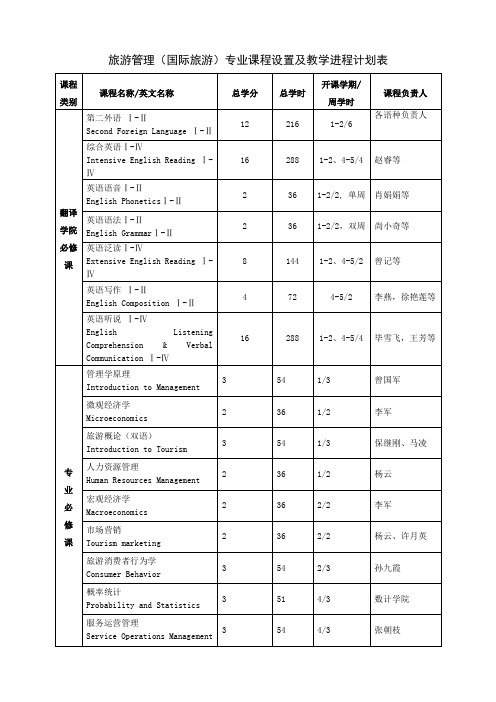
54
7/3
饶勇
酒店成本会计
Hotel Cost Accounting
3
54
8/3
外聘
酒店收益管理
Hotel Revenue Management
3
54
8/3
外聘
酒店督导管理
Supervision in the Hospitality Industry
2
36
8/2
饶勇
休
闲
与
俱
乐
部
管
理
选
修
课
休闲与体育旅游
2
36
10/2
戴耀宗
旅
游
规
划
与
管
理
选
修
课
旅游规划与公共政策
Tourism Planning and Public Policy
3
54
7/3
徐红罡
景区经营管理
Tourist Destination Managemen
旅游电子商务
Tourism E-Commerce
3
54
8/3
吴浩存
社区旅游规划与管理
Community-Based Tourism Planning and Management
3
54
8/3
孙九霞
旅游目的地营销
Tourism Destination Marketing
3
54
8/3
外聘
景观设计
Landscape Design
3
54
8/3
林敏慧
服务实习
Practice
英语写作 Ⅰ-Ⅱ
English Composition Ⅰ-Ⅱ
英国酒店旅游管理专业院校推荐.doc
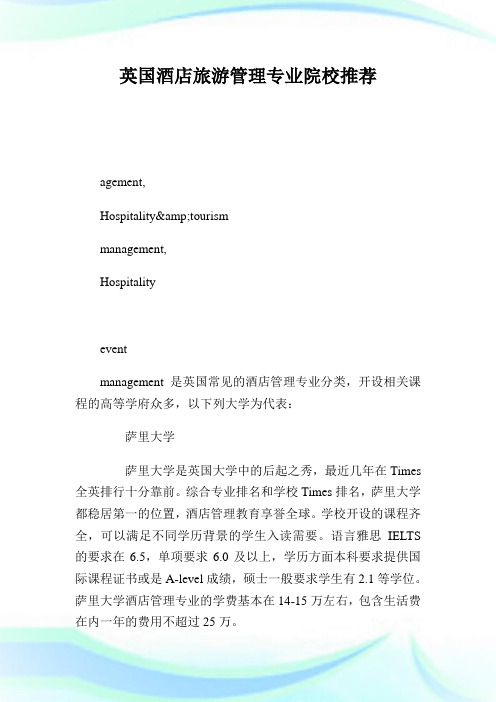
英国酒店旅游管理专业院校推荐agement,Hospitality&tourismmanagement,Hospitalityeventmanagement是英国常见的酒店管理专业分类,开设相关课程的高等学府众多,以下列大学为代表:萨里大学萨里大学是英国大学中的后起之秀,最近几年在Times 全英排行十分靠前。
综合专业排名和学校Times排名,萨里大学都稳居第一的位置,酒店管理教育享誉全球。
学校开设的课程齐全,可以满足不同学历背景的学生入读需要。
语言雅思IELTS 的要求在6.5,单项要求6.0及以上,学历方面本科要求提供国际课程证书或是A-level成绩,硕士一般要求学生有2.1等学位。
萨里大学酒店管理专业的学费基本在14-15万左右,包含生活费在内一年的费用不超过25万。
谢菲尔德哈勒姆大学谢哈成立于1843年,建校历史悠久,位于谢菲尔德市,是第一批和中国高等教育学府互认的英国大学之一。
谢哈的款待业相关课程在全英排名靠前,同时学费相对而言比较便宜,费用在18-20万一年。
学校的入学语言要求6.0,比较容易达到的语言门槛让不少语言方面有顾虑的学生多了一个选择。
学校开设有本科、硕士以及top-up等课程帮助不同学术背景的学生实现课程的对接。
谢哈的酒店管理教育在酒店行业享有盛誉,学校在研究生课程中会根据学生的入学时间提供半年到一年不等的实习机会,学生可以自主选择课程时长。
哈德斯菲尔德大学哈德斯菲尔德大学是一所历史悠久的公立大学。
坐落于英格兰中部的西约克郡,距离伦敦仅两个小时的路程,交通便利。
学校开设有酒店管理、旅游管理相关专业的课程。
学校的学术门槛和语言要求适中,和中国课程衔接程度高,费用基本在18万左右,比较适中。
本科阶段的酒店管理专业课程方向中含有短期实习,可以满足学生积累工作经验的需求。
相对而言这所学校和中国大学之间的衔接程度更好,学校开设有Top-upHospitalityBusinessManagement方向一年制课程,可以接受中国两年制大专学生申请。
- 1、下载文档前请自行甄别文档内容的完整性,平台不提供额外的编辑、内容补充、找答案等附加服务。
- 2、"仅部分预览"的文档,不可在线预览部分如存在完整性等问题,可反馈申请退款(可完整预览的文档不适用该条件!)。
- 3、如文档侵犯您的权益,请联系客服反馈,我们会尽快为您处理(人工客服工作时间:9:00-18:30)。
英国国际酒店与旅游管理课程中英文对照
课程英文名课程翻译中文名
Marketing 市场营销
Hospitality Concept and Innovations 酒店概念与创新
Dissertation 硕士毕业论文
Tourism Destination Management and Marketing 旅游目的地管理与市场营销
Major Event Policy and Practice 重要会展政策与应用Research Methods 研究方法
Leadership and Entrepreneurship 领导能力与企业家能力
Research and Consultancy Project 顾问设计与研究
Managing People 人员管理
Sector Industry Analysis 产业分析
以上课程有些都为提及旅游,但课程范围都在旅游范围内,例如:市场营销是专门针对旅游产业的市场营销,研究方法具体涉及旅游产业的研究方法等等。
荷兰旅游管理课程中英文对照
课程英文名
Concept Development Tourism & Leisure Industry A1 旅游与休闲管理产业概展A1 Concept Development Tourism & Leisure Industry A2 旅游与休闲管理产业概展A2 Concept Development Tourism & Leisure Industry A3 旅游与休闲管理产业概展A3 Introduction (IP)A 课程介绍
Strategic Management (IP) C 战略管理Strategic Management (IP) PR 战略管理Strategic Management (IP) Wr 战略管理
Thesis (IP) M 毕业论文M Thesis (IP) W1 毕业论文W1 Thesis (IP) W2 毕业论文W2 Workshop 1 (IP) C 课程研讨Workshop 1 (IP) W 课程研讨Workshop 1 (IP) W 课程研讨
我保证,以上课程均经过教育部的国外学历学位认证,真实准确。
如有不同虚假,愿付全部责任。
